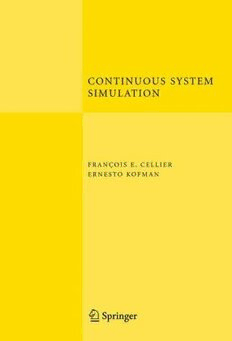Download Continuous System Simulation PDF Free - Full Version
Download Continuous System Simulation by François E. Cellier, Ernesto Kofman in PDF format completely FREE. No registration required, no payment needed. Get instant access to this valuable resource on PDFdrive.to!
About Continuous System Simulation
Continuous System Simulation describes systematically and methodically how mathematical models of dynamic systems, usually described by sets of either ordinary or partial differential equations possibly coupled with algebraic equations, can be simulated on a digital computer. Modern modeling and simulation environments relieve the occasional user from having to understand how simulation really works. Once a mathematical model of a process has been formulated, the modeling and simulation environment compiles and simulates the model, and curves of result trajectories appear magically on the user’s screen. Yet, magic has a tendency to fail, and it is then that the user must understand what went wrong, and why the model could not be simulated as expected. Continuous System Simulation is written by engineers for engineers, introducing the partly symbolical and partly numerical algorithms that drive the process of simulation in terms that are familiar to simulation practitioners with an engineering background, and yet, the text is rigorous in its approach and comprehensive in its coverage, providing the reader with a thorough and detailed understanding of the mechanisms that govern the simulation of dynamical systems. Continuous System Simulation is a highly software-oriented text, based on MATLAB. Homework problems, suggestions for term project, and open research questions conclude every chapter to deepen the understanding of the student and increase his or her motivation. Continuous System Simulation is the first text of its kind that has been written for an engineering audience primarily. Yet due to the depth and breadth of its coverage, the book will also be highly useful for readers with a mathematics background. The book has been designed to accompany senior and graduate students enrolled in a simulation class, but it may also serve as a reference and self-study guide for modeling and simulation practitioners.
Detailed Information
| Author: | François E. Cellier, Ernesto Kofman |
|---|---|
| Publication Year: | 2006 |
| Pages: | 658 |
| Language: | English |
| File Size: | 4.44 |
| Format: | |
| Price: | FREE |
Safe & Secure Download - No registration required
Why Choose PDFdrive for Your Free Continuous System Simulation Download?
- 100% Free: No hidden fees or subscriptions required for one book every day.
- No Registration: Immediate access is available without creating accounts for one book every day.
- Safe and Secure: Clean downloads without malware or viruses
- Multiple Formats: PDF, MOBI, Mpub,... optimized for all devices
- Educational Resource: Supporting knowledge sharing and learning
Frequently Asked Questions
Is it really free to download Continuous System Simulation PDF?
Yes, on https://PDFdrive.to you can download Continuous System Simulation by François E. Cellier, Ernesto Kofman completely free. We don't require any payment, subscription, or registration to access this PDF file. For 3 books every day.
How can I read Continuous System Simulation on my mobile device?
After downloading Continuous System Simulation PDF, you can open it with any PDF reader app on your phone or tablet. We recommend using Adobe Acrobat Reader, Apple Books, or Google Play Books for the best reading experience.
Is this the full version of Continuous System Simulation?
Yes, this is the complete PDF version of Continuous System Simulation by François E. Cellier, Ernesto Kofman. You will be able to read the entire content as in the printed version without missing any pages.
Is it legal to download Continuous System Simulation PDF for free?
https://PDFdrive.to provides links to free educational resources available online. We do not store any files on our servers. Please be aware of copyright laws in your country before downloading.
The materials shared are intended for research, educational, and personal use in accordance with fair use principles.

